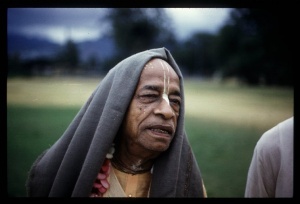SB 7.3.21: Difference between revisions
No edit summary |
(Vanibot #0054 edit - transform synonyms into clickable links, which search similar occurrences) |
||
| Line 23: | Line 23: | ||
<div class="synonyms"> | <div class="synonyms"> | ||
''tataḥ'' | ''[//vanipedia.org/wiki/Special:VaniSearch?s=tataḥ&tab=syno_o&ds=1 tataḥ]'' — because of this; ''[//vanipedia.org/wiki/Special:VaniSearch?s=te&tab=syno_o&ds=1 te]'' — unto you; ''[//vanipedia.org/wiki/Special:VaniSearch?s=āśiṣaḥ&tab=syno_o&ds=1 āśiṣaḥ]'' — benedictions; ''[//vanipedia.org/wiki/Special:VaniSearch?s=sarvāḥ&tab=syno_o&ds=1 sarvāḥ]'' — all; ''[//vanipedia.org/wiki/Special:VaniSearch?s=dadāmi&tab=syno_o&ds=1 dadāmi]'' — I shall give; ''[//vanipedia.org/wiki/Special:VaniSearch?s=asura&tab=syno_o&ds=1 asura]-[//vanipedia.org/wiki/Special:VaniSearch?s=puṅgava&tab=syno_o&ds=1 puṅgava]'' — O best of the asuras; ''[//vanipedia.org/wiki/Special:VaniSearch?s=martasya&tab=syno_o&ds=1 martasya]'' — of one who is destined to die; ''[//vanipedia.org/wiki/Special:VaniSearch?s=te&tab=syno_o&ds=1 te]'' — such as you; ''[//vanipedia.org/wiki/Special:VaniSearch?s=hi&tab=syno_o&ds=1 hi]'' — indeed; ''[//vanipedia.org/wiki/Special:VaniSearch?s=amartasya&tab=syno_o&ds=1 amartasya]'' — of one who does not die; ''[//vanipedia.org/wiki/Special:VaniSearch?s=darśanam&tab=syno_o&ds=1 darśanam]'' — the audience; ''[//vanipedia.org/wiki/Special:VaniSearch?s=na&tab=syno_o&ds=1 na]'' — not; ''[//vanipedia.org/wiki/Special:VaniSearch?s=aphalam&tab=syno_o&ds=1 aphalam]'' — without results; ''[//vanipedia.org/wiki/Special:VaniSearch?s=mama&tab=syno_o&ds=1 mama]'' — my. | ||
</div> | </div> | ||
Latest revision as of 23:00, 18 February 2024

A.C. Bhaktivedanta Swami Prabhupada
TEXT 21
- tatas ta āśiṣaḥ sarvā
- dadāmy asura-puṅgava
- martasya te hy amartasya
- darśanaṁ nāphalaṁ mama
SYNONYMS
tataḥ — because of this; te — unto you; āśiṣaḥ — benedictions; sarvāḥ — all; dadāmi — I shall give; asura-puṅgava — O best of the asuras; martasya — of one who is destined to die; te — such as you; hi — indeed; amartasya — of one who does not die; darśanam — the audience; na — not; aphalam — without results; mama — my.
TRANSLATION
O best of the asuras, for this reason I am now prepared to give you all benedictions, according to your desire. I belong to the celestial world of demigods, who do not die like human beings. Therefore, although you are subject to death, your audience with me will not go in vain.
PURPORT
It appears that human beings and asuras are subject to death, whereas demigods are not. The demigods who reside with Lord Brahmā in Satyaloka go to Vaikuṇṭhaloka in their present bodily constructions at the time of the dissolution. Therefore although Hiraṇyakaśipu had undergone severe austerities, Lord Brahmā predicted that he had to die; he could not become immortal or even gain equal status with the demigods. The great austerities and penances he had performed for so many years could not give him protection from death. This was foretold by Lord Brahmā.